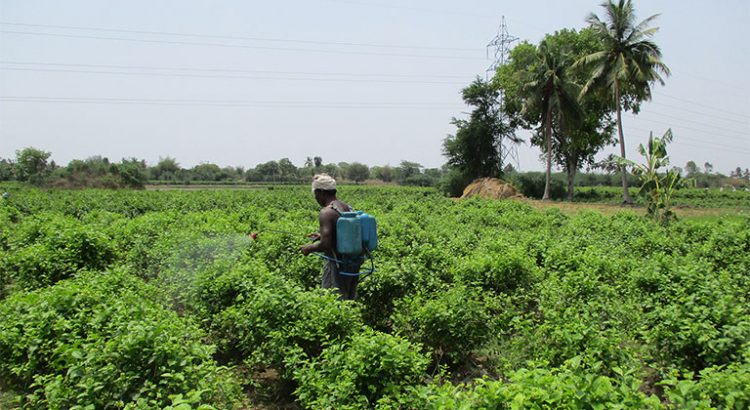Geneva, Switzerland—PAN Asia Pacific urges Parties to the Basel, Rotterdam and Stockholm (BRS) Conventions to adopt agroecology in place of hazardous pesticides, as the Triple Conference of Parties (COPs) convenes from 29 April to 10 May 2019 to discuss the proposed listing of a number of pesticides that have harmful effects on human health and the environment.
Pesticide Action Network (PAN),* is releasing a position paper on agroecology, which lays down the principles of agroecology, its multifunctional benefits, and how it contributes to the Sustainable Development Goals (SDGs). Agroecology, in PAN’s definition, puts farmers first; promotes soil health, biodiversity and natural ecosystem function; integrates science with knowledge and practice; promotes complexity over simplicity; and minimises waste and optimises energy use.
“Governments that oppose the inclusion of pesticides in the Rotterdam and Stockholm Conventions that they agree meet the Conventions’ criteria always reason that there are no alternatives. In fact, they are only choosing to side with big business and ignore agroecology, which even the FAO has recognised as a viable and urgent alternative to chemical-intensive agriculture,” said Sarojeni Rengam, PANAP Executive Director.
“Of course, pesticides listed under the Rotterdam Convention do not have to be phased out – the Convention simply provides for the exchange of information on adverse impacts – but countries can take advantage of this process to find out more about safer alternatives such as agroecological alternatives,” said PANAP Senior Science Advisor Dr. Meriel Watts, who is at the COPs. PAN has an information booth at the COPs highlighting the advantages of agroecology.
According to the PAN position paper on agroecology, “Transitioning towards sustainable agriculture in the 21st century requires a decisive shift of institutional and policy support towards agroecology—made urgent by new evidence that many ecosystems are verging on collapse, the effects of climate change are intensifying, and reliance on Highly Hazardous Pesticides continues to destroy the health, lives and livelihoods of communities around the world.”
PANAP urges the COPs to list carbosulfan, acetochlor, and phorate, and formulations of paraquat and fenthion in Annex 3 of the Rotterdam Convention**, since these have already met the criteria for listing. PANAP also supports the listing of the HHP dicofol under the Stockholm Convention without any specific exemptions as the POPs Review Committee (POPRC), Stockholm’s technical committee, could not find any critical uses for this miticide.
“Some countries continue to unfairly and unreasonably block the listing of some of these pesticides, especially paraquat. It is unconscionable that paraquat has already been banned in 46*** countries, and yet the global community has not decisively taken action to stem the tide of poisoning that it has created, especially among the most vulnerable farming communities who just don’t have access to any kind of information on its toxicity,” Dr. Watts said.
PANAP’s study Of Rights and Poisons reveal appalling conditions of use of paraquat in seven countries in the Asia Pacific. In India, paraquat was being sold by retailers in small plastic bags and accidentally spilled by farmers on body parts. In the Philippines, paraquat was being sprayed by plantation workers without protective clothing, resulting to illnesses such as blindness, skin disease, reproductive problems, and paralysis.
Dr. Watts further pointed out that the technical committees of both Conventions have recognised that agroecological practices are an effective alternative to the pesticides up for listing. “The recognition of agroecology as an alternative to hazardous pesticides is clearly there. So Parties need to stop stalling and list these pesticides in the Conventions where they belong—Conventions which, as it is, only address the gravity and persistence of the problem with a tiny portion of pesticides in current use,” Dr. Watts said.
Pesticide Action Network is supporting calls for a comprehensive global legally-binding treaty or mechanism for the life-cycle management of pesticides, with the goal of eliminating the harm the caused to people and the environment. Agroecology and the need for a global treaty on HHPs will be discussed in a Triple COPs side event organised by PAN entitled “Highly Hazardous Pesticides: International Management,” to be held on 8 May 2019.
For reference:
Dr. Meriel Watts, PAN Asia Pacific Senior Science Advisor, meriel@merielwatts.net; Skype: meriel4747
Ms. Sarojeni Rengam, PAN Asia Pacific Executive Director, sarojeni.rengam@panap.net
* Pesticide Action Network (PAN) is a network of over 600 participating nongovernmental organizations, institutions and individuals in over 90 countries working to replace the use of hazardous pesticides with ecologically sound and socially just alternatives. PAN Asia Pacific is one of the 5 regional centres that make up PAN International.
** Pesticides listed in Annex 3 of the Rotterdam Convention will be subject to a procedure (Prior Informed Consent Procedure) whereby an informed decision of a country would be needed before a country gives consent or not for future importation of the pesticide. While listing does not constitute a ban, it opens avenues for developing countries to build their capacity to evaluate pesticides and adopt agroecological strategies in managing pests.
***According to the latest PAN International Consolidated List of Banned Pesticides








Discussion about this post